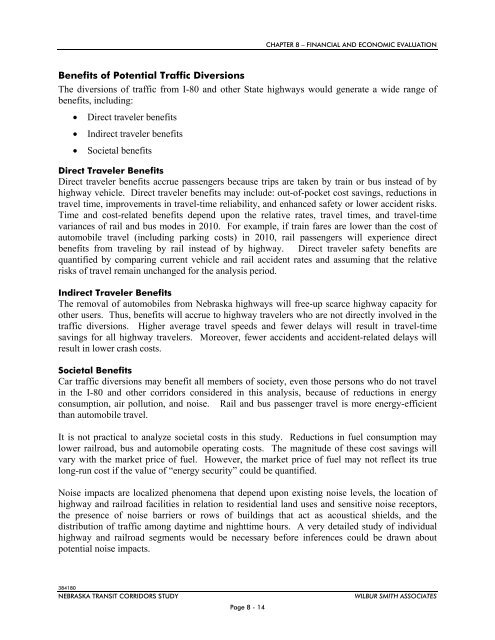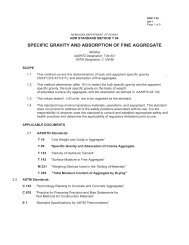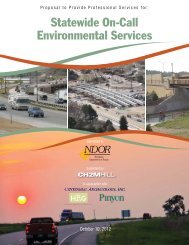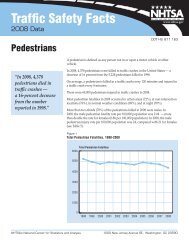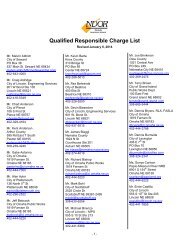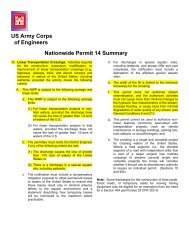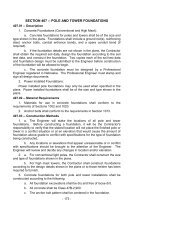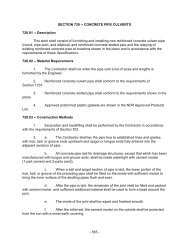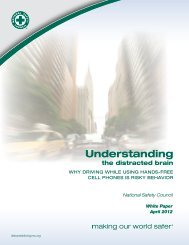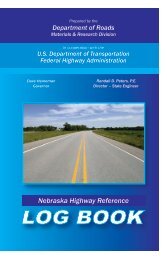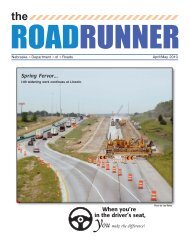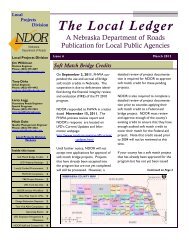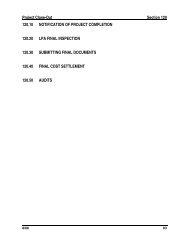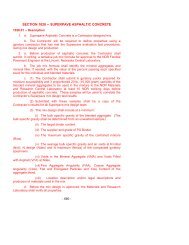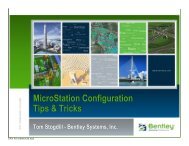NTRAC Final Study - Nebraska Department of Roads - State of ...
NTRAC Final Study - Nebraska Department of Roads - State of ...
NTRAC Final Study - Nebraska Department of Roads - State of ...
Create successful ePaper yourself
Turn your PDF publications into a flip-book with our unique Google optimized e-Paper software.
CHAPTER 8 – FINANCIAL AND ECONOMIC EVALUATION<br />
Benefits <strong>of</strong> Potential Traffic Diversions<br />
The diversions <strong>of</strong> traffic from I-80 and other <strong>State</strong> highways would generate a wide range <strong>of</strong><br />
benefits, including:<br />
Direct traveler benefits<br />
Indirect traveler benefits<br />
Societal benefits<br />
Direct Traveler Benefits<br />
Direct traveler benefits accrue passengers because trips are taken by train or bus instead <strong>of</strong> by<br />
highway vehicle. Direct traveler benefits may include: out-<strong>of</strong>-pocket cost savings, reductions in<br />
travel time, improvements in travel-time reliability, and enhanced safety or lower accident risks.<br />
Time and cost-related benefits depend upon the relative rates, travel times, and travel-time<br />
variances <strong>of</strong> rail and bus modes in 2010. For example, if train fares are lower than the cost <strong>of</strong><br />
automobile travel (including parking costs) in 2010, rail passengers will experience direct<br />
benefits from traveling by rail instead <strong>of</strong> by highway. Direct traveler safety benefits are<br />
quantified by comparing current vehicle and rail accident rates and assuming that the relative<br />
risks <strong>of</strong> travel remain unchanged for the analysis period.<br />
Indirect Traveler Benefits<br />
The removal <strong>of</strong> automobiles from <strong>Nebraska</strong> highways will free-up scarce highway capacity for<br />
other users. Thus, benefits will accrue to highway travelers who are not directly involved in the<br />
traffic diversions. Higher average travel speeds and fewer delays will result in travel-time<br />
savings for all highway travelers. Moreover, fewer accidents and accident-related delays will<br />
result in lower crash costs.<br />
Societal Benefits<br />
Car traffic diversions may benefit all members <strong>of</strong> society, even those persons who do not travel<br />
in the I-80 and other corridors considered in this analysis, because <strong>of</strong> reductions in energy<br />
consumption, air pollution, and noise. Rail and bus passenger travel is more energy-efficient<br />
than automobile travel.<br />
It is not practical to analyze societal costs in this study. Reductions in fuel consumption may<br />
lower railroad, bus and automobile operating costs. The magnitude <strong>of</strong> these cost savings will<br />
vary with the market price <strong>of</strong> fuel. However, the market price <strong>of</strong> fuel may not reflect its true<br />
long-run cost if the value <strong>of</strong> “energy security” could be quantified.<br />
Noise impacts are localized phenomena that depend upon existing noise levels, the location <strong>of</strong><br />
highway and railroad facilities in relation to residential land uses and sensitive noise receptors,<br />
the presence <strong>of</strong> noise barriers or rows <strong>of</strong> buildings that act as acoustical shields, and the<br />
distribution <strong>of</strong> traffic among daytime and nighttime hours. A very detailed study <strong>of</strong> individual<br />
highway and railroad segments would be necessary before inferences could be drawn about<br />
potential noise impacts.<br />
384180<br />
NEBRASKA TRANSIT CORRIDORS STUDY<br />
Page 8 - 14<br />
WILBUR SMITH ASSOCIATES


